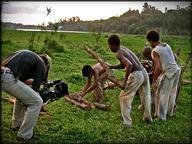Quiz Answer Key and Fun Facts
1. In the early 1820s, this man led a slave rebellion in Charleston, South Carolina. Who was it?
2. In the summer of 1800, a successful slave revolt resulted in the capture of Richmond, Virginia.
3. What nickname was given to "underground railroad" conductor Harriet Tubman?
4. Which slave, called "The Prophet" by his followers, interpreted a solar eclipse as a sign from God to kill his oppressors?
5. What was the name of the abolitionist newspaper published by William Lloyd Garrison?
6. Was Sojourner Truth's real name Isabella Baumfree?
7. Which radical abolitionist tried to incite a massive slave rebellion in Virginia?
8. Were women, generally, welcomed into the anti-slavery movement by men?
9. The American Colonization Society wanted to settle African-Americans in a West African country. Which was it?
10. What book did Abraham Lincoln credit as a cause of the Civil War?
Source: Author
laughinggirl
This quiz was reviewed by FunTrivia editor
bloomsby before going online.
Any errors found in FunTrivia content are routinely corrected through our feedback system.

